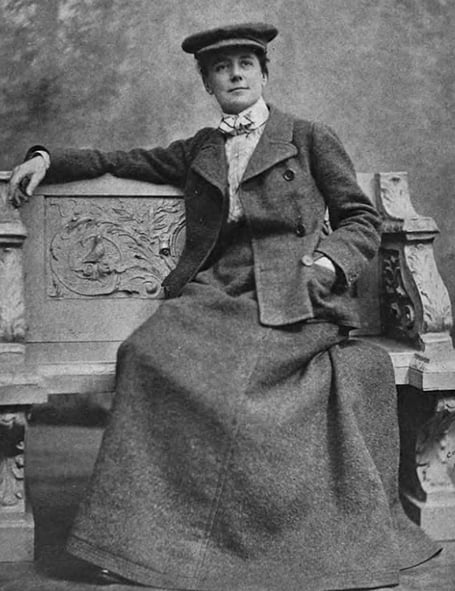Composer, musical arranger, author and societal campaigner Dame Ethel Smyth was also a suffragette who fought for women to get the vote.
She lived in Hook Heath, Woking, for a number of years and her statue – unveiled in 2022 – is in the town’s Dukes Plaza. She was appointed Dame of the Order of the British Empire in 1922.
Much has been written about her colourful life including her friendship with famous suffragette Emmeline Pankhurst.
Smyth was an activist in the Votes for Women campaign. She was imprisoned for her part in the suffragettes’ window-smashing spree in March 1912.
However, what appears to be much less known is that in July 1912 she was arrested again, this time on suspicion of arson.
This has come to light because of a chance find by Peeps researcher Mark Coxhead, who was reading microfilm copies of the News & Mail at the Surrey History Centre in Woking.
In the News & Mail of July 26, 1912, it was reported that Smyth had been arrested at her house, The Coign, in connection with the alleged suffragette attempt to burn down Lewis Harcourt’s house near Oxford.
She was taken to Woking police station and then to Oxford where she was charged with “having been concerned in the alleged fire-raising plot”. Smyth was released on bail of £1,000.
The following week’s News & Mail reported that Smyth had appeared before magistrates at a special session held in private and “was able to completely satisfy the bench as to her movements on the night in question”, and that she received an apology regarding her detention.
This was followed by a letter from Smyth to the News & Mail editor explaining exactly what she felt about her wrongful arrest.
She wrote: “I wish to protest strongly, not only of my arrest, which was a particularly brilliant specimen on the part of the police, especially when they have a ‘women-hunting’ government (to quote the words of Mr Harben, a distinguished Liberal candidate) egging them on, but more particularly against the press reports for the reason of my discharge.”
Here she was attacking the public prosecutor who had excluded the press and public from what she said was her “so-called trial”.
Her letter continued: “My alibi was so irresistible that no evidence whatsoever was brought against me.
“I was subjected to an identification test, which of course, failed, and discharged with profuse apologies.”
She said the deputy chief constable of Oxfordshire had not “ascertained where I was on July 13, which the Woking police could have told him without difficulty.
“That such a wanton infringement of one’s liberty should have been committed shows what lengths of folly the police are capable of going; and may I here observe that my imprisonment at Holloway won for me the sad experience that at least one third of the poorest class of women who are arrested are absolutely innocent – the victims of police blunders which the magistrates never inquire into.”
She had been sent to prison in March 1912 having been convicted as one of many involved in the suffragettes’ window-smashing campaign.
Smyth went on to write: “This is, from first to last, a perfect sample of the government’s methods of silencing the claim of women to the vote, that is, for the money’s worth paid by women to the upkeep of the state and towards the salaries of these gentlemen.
“I hereby recommend critics to stop vituperating women, and turn their attention to the men who have driven the most law-abiding half of the community to desperation.”
Smyth had joined the Women’s Social and Political Union (WSPU) in 1910.
One of her most abiding compositions is the battle song The March of the Women, to words by Cicely Hamilton.
It became the official anthem of the WSPU – and processions of suffragettes carried cards printed with the music and lyrics.
She was a member of the ladies’ section at Woking Golf Club in Hook Heath.
Reputedly it was on the course that she taught Pankhurst to throw stones.
Smyth’s part in the window-smashing campaign was with Pankhurst.
They targeted the office at the Houses of Parliament of the Secretary of State for the Colonies, Lewis Harcourt – the same man whose home Smyth was alleged to have attempted to burn down.
Smyth and Pankhurst smashed the windows of Harcourt’s office, citing condescending comments he had made about the Votes for Women campaign.
They were tried and convicted and sent to Holloway Prison.
Some historical reports state their sentences were for two months, while others state Smyth was imprisoned for a “short time”.
Mark Coxhead has found a story in the News & Mail of April 19, 1912 reporting Smyth’s release from Holloway Prison. It states she was “liberated for reasons of health”. The date of her release reveals she did not serve the two months she had been sentenced to.
That report also notes another suffragette from Woking, Phyllis Keller, was sentenced to one month’s hard labour at the same time that Smyth was sentenced.
Another widely known tale recalls how the composer Sir Thomas Beecham visited suffragettes in Holloway Prison.
He later said that as he arrived in the prison’s main courtyard he saw the women marching around singing their “war chant” while Smyth, overlooking from an upstairs window, beat time and conducted her fellow prisoners with a toothbrush.
Smyth died at her home at Hook Heath in 1944.



.jpeg?width=209&height=140&crop=209:145,smart&quality=75)

Comments
This article has no comments yet. Be the first to leave a comment.